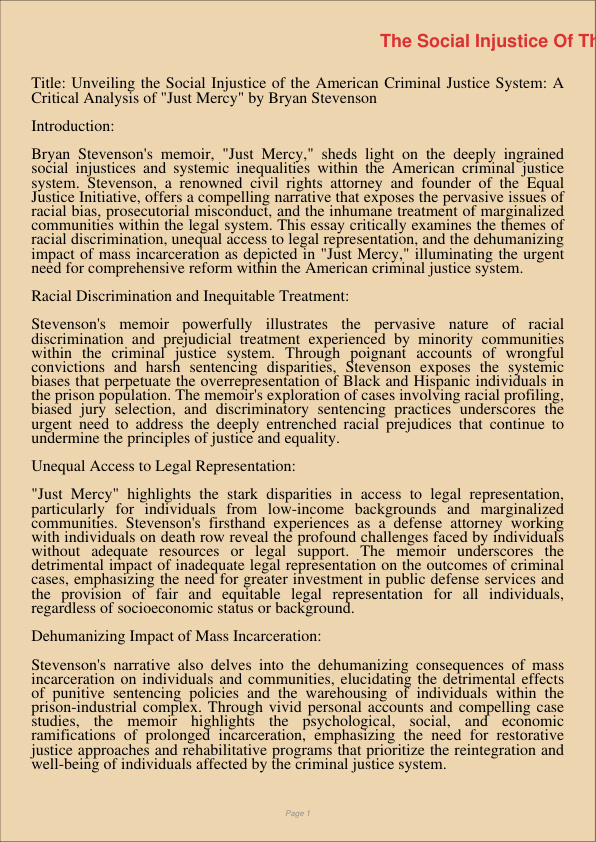The Social Injustice Of The American Criminal Justice System Presented In Just Mercy A Memoir By Bryan Stevenson
Jan 9, 2024
american criminal justice system presented
social injustice
Biology
Sociology

Title: Unveiling the Social Injustice of the American Criminal Justice System: A Critical Analysis of “Just Mercy” by Bryan Stevenson
Introduction:
Bryan Stevenson’s memoir, “Just Mercy,” sheds light on the deeply ingrained social injustices and systemic inequalities within the American criminal justice system. Stevenson, a renowned civil rights attorney and founder of the Equal Justice Initiative, offers a compelling narrative that exposes the pervasive issues of racial bias, prosecutorial misconduct, and the inhumane treatment of marginalized communities within the legal system. This essay critically examines the themes of racial discrimination, unequal access to legal representation, and the dehumanizing impact of mass incarceration as depicted in “Just Mercy,” illuminating the urgent need for comprehensive reform within the American criminal justice system.
Racial Discrimination and Inequitable Treatment:
Stevenson’s memoir powerfully illustrates the pervasive nature of racial discrimination and prejudicial treatment experienced by minority communities within the criminal justice system. Through poignant accounts of wrongful convictions and harsh sentencing disparities, Stevenson exposes the systemic biases that perpetuate the overrepresentation of Black and Hispanic individuals in the prison population. The memoir’s exploration of cases involving racial profiling, biased jury selection, and discriminatory sentencing practices underscores the urgent need to address the deeply entrenched racial prejudices that continue to undermine the principles of justice and equality.
Unequal Access to Legal Representation:
“Just Mercy” highlights the stark disparities in access to legal representation, particularly for individuals from low-income backgrounds and marginalized communities. Stevenson’s firsthand experiences as a defense attorney working with individuals on death row reveal the profound challenges faced by individuals without adequate resources or legal support. The memoir underscores the detrimental impact of inadequate legal representation on the outcomes of criminal cases, emphasizing the need for greater investment in public defense services and the provision of fair and equitable legal representation for all individuals, regardless of socioeconomic status or background.
Dehumanizing Impact of Mass Incarceration:
Stevenson’s narrative also delves into the dehumanizing consequences of mass incarceration on individuals and communities, elucidating the detrimental effects of punitive sentencing policies and the warehousing of individuals within the prison-industrial complex. Through vivid personal accounts and compelling case studies, the memoir highlights the psychological, social, and economic ramifications of prolonged incarceration, emphasizing the need for restorative justice approaches and rehabilitative programs that prioritize the reintegration and well-being of individuals affected by the criminal justice system.
Calls for Comprehensive Reform and Advocacy:
In “Just Mercy,” Stevenson calls for comprehensive reform within the American criminal justice system, advocating for policy changes that address systemic biases, promote equitable legal representation, and prioritize rehabilitation over punitive measures. The memoir serves as a poignant call to action, urging policymakers, legal professionals, and communities to confront the deep-rooted social injustices that contribute to the perpetuation of inequality and discrimination within the criminal justice system. Stevenson’s narrative underscores the imperative of collective advocacy and concerted efforts to effect meaningful change, emphasizing the importance of upholding the principles of fairness, equity, and human dignity within the pursuit of justice.
Conclusion:
Through “Just Mercy,” Bryan Stevenson offers a searing indictment of the social injustices and systemic inequalities that plague the American criminal justice system. His poignant narrative serves as a powerful testament to the enduring struggles faced by marginalized communities and individuals impacted by racial discrimination and inequitable legal practices. By shedding light on the dehumanizing consequences of mass incarceration and advocating for comprehensive reform, Stevenson’s memoir underscores the pressing need for a more just, equitable, and humane approach to criminal justice. “Just Mercy” stands as a compelling call to action, urging readers to confront the pervasive injustices within the legal system and work toward fostering a more inclusive and equitable society for all.